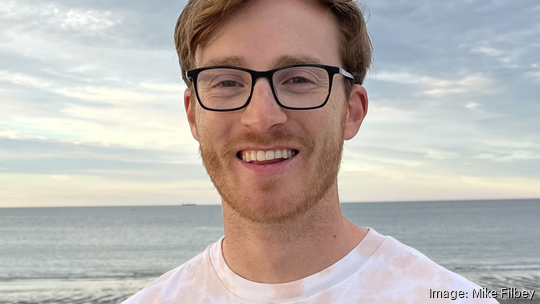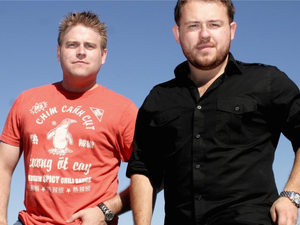
For several years, Mike Filbey was the co-founder and marketing mind behind one of Boston’s most unique startups, ButcherBox, which delivers meat and seafood to customers’ doors.
When Filbey left the company in 2019, he found himself with some money and a desire to do good with it. But he quickly realized he was spending too much time researching how to make a donation that would have the most real-world impact. So Filbey put together and recently launched his own nonprofit, Pepper, which aims to streamline the process for donating to impactful charities and make giving more accessible for everyday people.
A background in business
ButcherBox wasn’t the first business that Filbey had helped launch. When he was a senior in high school, he created Cbay. The company helped people who were downsizing to “sell everything but the house,” Filbey said. The young entrepreneur dropped out after his junior year of college to focus on Cbay, but ultimately ran into challenges scaling the business.
Filbey said he was debating whether to return to school when his mentor, Mike Salguero, reached out. Salguero, who had co-founded e-commerce company CustomMade in the early 2000s, had an idea for shipping grass-fed beef in the mail. Filbey ended up joining Salguero to launch what would become ButcherBox, where he would lead marketing.
At ButcherBox, one of Filbey’s first responsibilities was managing a Kickstarter campaign that ended up raising $210,000 in 30 days and securing their first 1,000 customers.
“From there, the business just kind of exploded,” Filbey said.
After four years of helping ButcherBox scale, Filbey decided to leave the company. He didn’t want to step away, but felt he needed some mental and physical respite after years of grinding and building.
The path to Pepper
After leaving ButcherBox, Filbey said he sold some of his company shares.
“It was a meaningful amount of money to me. It was the first time I had a significant amount of money in my life,” Filbey said.
Filbey knew he wanted to give some of the money to charity. He started researching, and immediately felt overwhelmed by the number of options. He wanted to choose the organization where his money would have the most impact. Then his wife recommended he check out the book “The Life You Can Save” by Peter Singer. He started reading the book while enjoying a blueberry muffin and a coffee at a bakery in Harvard Square.
“By the time I read a few chapters, I felt guilty about buying the blueberry muffin and coffee, because the author does a really good job of detailing how much you can do with a really small amount of money if you give to some of these evidence-based organizations,” Filbey said.
Filbey felt a renewed sense of mission to find charities where a few dollars could have a big impact on people's lives. But he realized donating his own money was not enough. He also wanted to help others discover the impact they could have — even with a small donation. And, he didn't want everyone to spend hours finding the perfect charity.
A giving tool for everyday people
Filbey created Pepper, named after a small food that can pack a big punch, to help make giving easier and more impactful. People can sign up through the nonprofit to give $10 a month that is split evenly between four partner charities: Malaria Consortium’s Seasonal Malaria Chemoprevention Program, Against Malaria Foundation, Helen Keller International’s Vitamin A Supplementation Program and GiveDirectly’s Cash Transfer Program – Africa.
Pepper’s charity partners were chosen based on Filbey’s own research and evaluations from GiveWell.org, which conducts independent evaluations of nonprofits and focuses on impact per dollar and funding needs.
“I felt like I had the knowledge just from doing a lot of this research as well as marketing experience to perhaps popularize giving in a way that hasn’t been achieved to date by really focusing on the everyday donor,” Filbey said.
To keep the donation process as simple and accessible as possible, Pepper only offers one donation level and doesn’t make users choose charities. One reason Filbey chose this approach was to eliminate feelings of guilt about how much users could donate.
“I also think it’s just cool that you can have a millionaire on Pepper giving the same amount as a high schooler. Everyone’s on the same field,” Filbey said.
For now, Filbey is covering the cost of running Pepper himself. He aims to use grants to fund the organization in the future.
His approach to getting the word out about Pepper has some similarities to the tactics he used at ButcherBox, where his team worked with paleo and keto influencers. He aims to work with influencers on platforms like YouTube and TikTok who produce content about donating to charities. Streamers on Twitch are also a target because many donate the “tips” that viewers leave to charities.
“I’m excited about exploring that space as a way to attract that kind of younger donor,” Filbey said.
Sign up for The Beat, BostInno’s free daily innovation newsletter. See past examples here.








